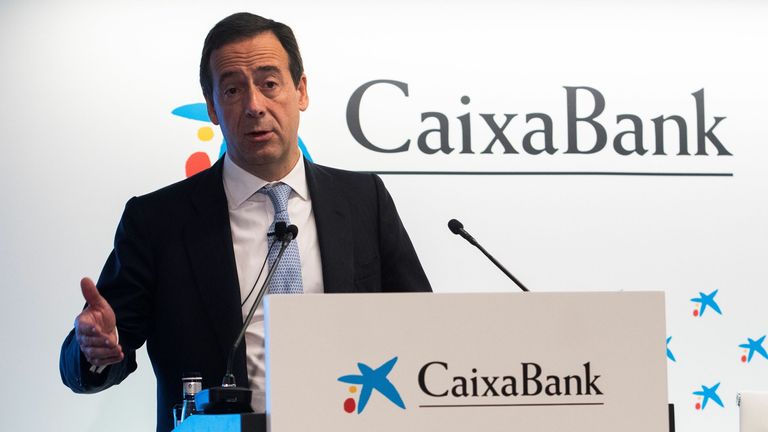Caixabank has announced the terms of the acquisition of state-owned lender Bankia in a deal that will create Spain’s biggest domestic bank.
Caixabank said on Friday that its board had agreed the previous day to approve and sign the joint merger plan, creating a bank with around €600bn (£548bn) in assets.
The combination of Caixabank and Bankia, respectively Spain’s third and fourth largest lenders, will still be smaller, overall, than local rivals Santander and BBVA – both of which have significant operations outside Spain.
The banks said the merger should be completed during the first quarter of next year.
Earlier this month, Sky’s business presenter Ian King wrote of the then-prospective merger: “The cost savings could be significant, with analysts suggesting that as many as half of the pair’s combined total of 6,000 branches could close.
“Secondly, the combined business would overtake Santander to become Spain’s biggest domestic lender, with approximately 30% of the market. That scale could give the combined entity a big competitive advantage.
“Thirdly, the institution would be less subject to state interference.”
Regarding the prospect of closures, Caixabank said on Friday that no decisions had been made but its combined entity would analyse workforce overlaps, duplications and economies of scale.
The new bank, with 51,500 employees in Spain, will be called Caixabank and the name Bankia will be gradually dropped.
It will have more than 20 million customers and a 24% market share in deposits; 25% in loans and 29% in long-term
savings products.
Bankia’s chairman José Ignacio Goirigolzarri Tellaeche said on Friday that he was “reasonably comfortable” that the merger would get antitrust approval.
Bankia’s Jose Ignacio Goirigolzarri will serve as executive chairman with limited powers and Gonzalo Gortazar, currently Caixabank’s chief, will be chief executive.
Bankia was created from the merger of seven local savings banks in 2010 but, less than two years later, the whole entity had to be part-nationalised after it came close to collapsing under the weight of doubtful property loans.
Madrid emerged with a 62% stake in Bankia but, after a merger with Caixabank, would have just 14% of the combined entity.
King added: “What has really excited investors about this potential merger, though, is the signal it sends to the wider banking sector.
“Europe’s banking sector is far more fragmented than in other parts of the world and, accordingly, its banks are much smaller than their counterparts in the United States and China.
“This has long been a cause of irritation to banking executives in Europe and there have been periodic calls for cross-border consolidation.”



